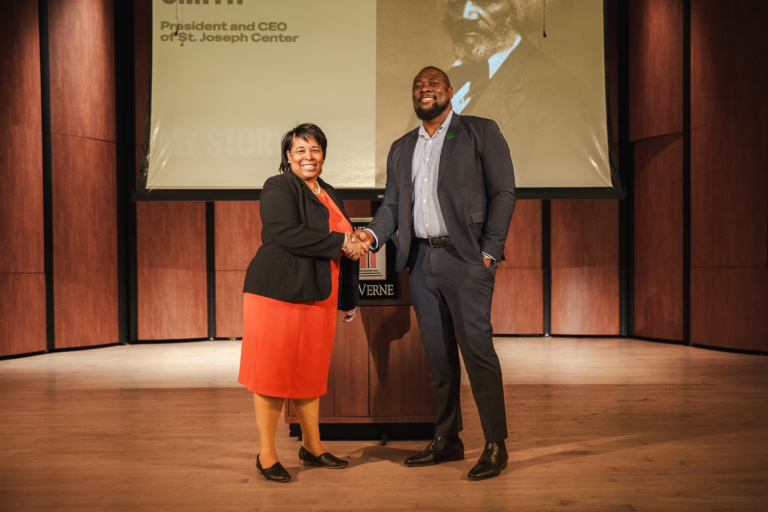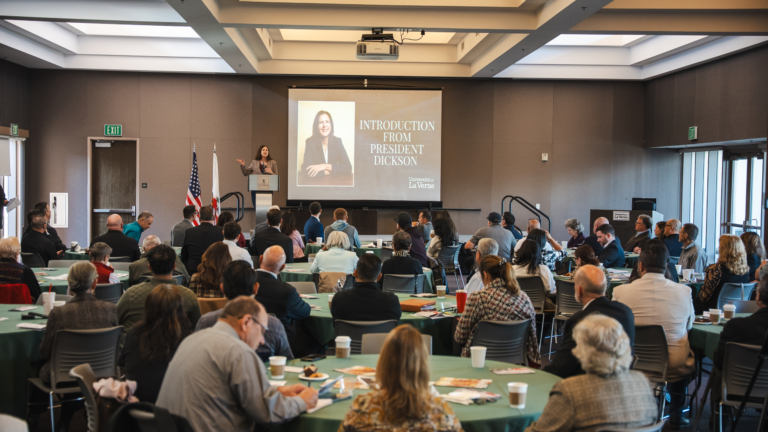La Verne Student Technology Use Statistics Presented at South by Southwest

When Associate Director of Learning Technology Nori Barajas-Murphy began surveying University of La Verne students on their use of laptops, smart phones and tablets for classes, faculty believed La Verne’s use was lower than at other institutions.
But in four years, the data she has collected paint a different picture.
“We often think our students don’t have the equipment,” she said. “We often don’t think they’re like students at other universities, and that’s not the case.”
In fact, the 2014 statistics Barajas-Murphy released to students Monday show that 90 percent of La Verne undergraduates own smart phones and laptops and 50 percent own tablets. Of students surveyed, 86 percent consider use of laptops very important or extremely important to academic success. Tablets came in second in terms of student importance at 49 percent and 35 percent of students considered smart phones important academically.
The data is included in a study by the EDUCAUSE Center for Analysis and Research, which is analyzing responses from students and faculty at universities across the country.
Barajas-Murphy joined a panel of academic researchers for the SXSWedu Conference and Festival on March 11 in Austin, Texas to present the national findings. They approached the presentation interactively, calling on audience members to guess and vote on different responses from the national data using mobile devices before the actual responses were revealed.
“I would say the folks in higher education really saw the data we had was significant,” Barajas-Murphy said.
Barajas-Murphy plans to continue her La Verne survey for one more year and analyze the data for trends. It is a subject that interests her because of the varying perceptions and evolving nature of instructional design.
“In the years I’ve been in faculty development, I hear it from (faculty) all the time – ‘My students can’t do it because they don’t have fill-in-the-blank,’” she said. “Faculty respond to data and are often willing to learn new instructional methods in response to that data.”
Each year she has conducted the study between 180 and 240 undergraduates have responded.
Beatriz Gonzalez, Associate Provost for Faculty Affairs & Professor of Educational Counseling, is working with Barajas-Murphy by distributing a companion survey involving faculty and technology use.
She also addresses learning management systems such as Blackboard in her research. Of students surveyed, 54 percent agreed or strongly agreed they would benefit from being better skilled at using the system, which is much more than simply a receptacle for documents and slideshows. With training, students and faculty could take advantage of the greater benefits Blackboard provides, such as engaging with instructors and classmates, tracking performance and receiving instructor feedback. This data supports more in depth training for faculty and students, she said.
“It’s like we bought an expensive electric toothbrush and we didn’t give them the batteries,” she said. “It can do so much more.”
But the La Verne study does show that, overall, students feel many instructors effectively use technology to support academic success. Sixty-five percent of students said all, almost all or most faculty fit into this category.
While perceptions persist about mobile devices being more of a distraction than a benefit in the classroom, Barajas-Murphy says the benefits cannot be ignored.
“Students want to use their mobile devices more and more and look to their instructor to model how to use those academically. Without instructor modeling, it’s wasted, and probably can be a distraction” she said.
Barajas-Murphy is currently collecting student surveys for 2015. Students have until April 10 to respond via e-mail to them.


